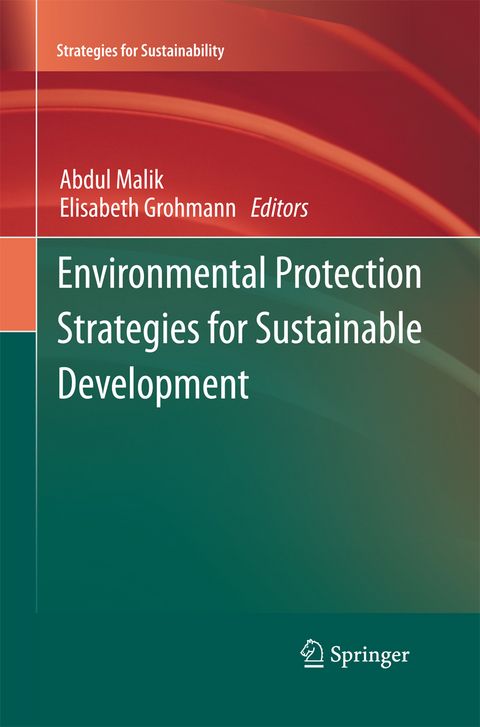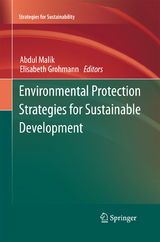Environmental Protection Strategies for Sustainable Development
The environment of our planet is degrading at an alarming rate because of non-sustainable urbanization, industrialization and agriculture. Unsustainable trends in relation to climate change and energy use, threats to public health, poverty and social exclusion, demographic pressure and ageing, management of natural resources, biodiversity loss, land use and transport still persist and new challenges are arising. Since these negative trends bring about a sense of urgency, short term action is required, whilst maintaining a longer term perspective. The main challenge is to gradually change our current unsustainable consumption and production patterns and the nonintegrated approach to policy-making.
This book covers the broad area including potential of rhizospheric microorganisms in the sustainable plant development in anthropogenic polluted soils, bioremediation of pesticides from soil and waste water, toxic metals from soil, biological treatment of pulp and paper industry wastewater, sustainable solutions for agro processing waste management, solid waste management on climate change and human health, environmental impact of dyes and its remediation. Various methods for genotoxicity testing of environmental pollutants are also discussed and chapters on molecular detection of resistance and transfer genes in the environmental samples, biofilm formation by the environmental bacteria, biochemical attributes to assess soil ecosystem sustainability, application of rhizobacteria in biotechnology, role of peroxidases as a tool for the decolorization and removal of dyes and potential of biopesticides in sustainable agriculture.
It offers a unique treatment of the subject, linking various protection strategies for sustainable development, describing the inter-relationships between the laboratory and field eco-toxicologist, the biotechnology consultant, environmental engineers and different international environmental regulatory andprotection agencies.
Dr. Abdul Malik is Chairman, Department of Agricultural Microbiology, Aligarh Muslim University, Aligarh, India. He received his Ph.D. Degree in Agricultural Microbiology from Aligarh Muslim University, Aligarh, India. Dr. Malik has been awarded several Fellowships and honors including DAAD fellowship (Germany), BOYSCAST overseas Fellowship, Jawahar Lal Nehru Memorial Fund award etc. He has been awarded Young Scientist project of Department of Science & Technology, Govt. of India twice. Dr. Malik has visited Technical University Berlin as Visiting Scientist in 2006, 2008 and 2009 and Universitätsklinikum Freiburg im Breisgau, Germany in 2010 under DAAD research programme. He has collaborative projects with Technical University Berlin, Germany and University of Minho, Braga, Portugal. He has received research grants from several funding agencies of the Govt. of India including DST, CSIR, UGC as Principal Investigator. His major areas of Research are Environmental Microbiology, Ecotoxicology, conjugative plasmids in bacteria, degradation of pesticides. Dr. Malik has published a number of research papers in leading scientific journals with high impact factor. Dr. Elisabeth Grohmann is Group Leader, Department of Infectious Diseases, University Hospital Freiburg, Germany. She received her Ph.D. degree in Molecular Biology and Biochemistry from Technical University, Graz, Austria. She completed her habilitation (Venia legendi) at the Faculty of Process Sciences/Department of Environmental Engineering of the Technical University, Berlin Germany. She has been awarded an Erwin-Schrödinger post doctoral fellowship. Up to February 2010 she was Molecular Biology Group Leader at the Technische Universität Berlin. She has received research grants from DFG, BMBF, EU, ESA, DLR etc. She has collaborative projects with Karl-Franzens-University, Graz, Austria, with universities and research centers in Belgium, USA, The Netherlands, Italy,Spain, Argentina, Chile, Norway, Mexico, Turkey and India. Her thrust area of research is conjugative plasmids (molecular mechanisms of DNA transfer) in bacteria. Dr. Grohmann has published a number of research papers in leading scientific journals with high impact factor in different research fields, bacteriology, environmental microbiology, biochemistry and molecular biology.
a1. Environmental Protection Strategies: An overview.- 2. The potential of rhizospheric microorganisms to promote the plant growth in disturbed soils.-3. Sustainable solutions for agro processing waste management: An overview.-4. Dyes - Environmental Impact and Remediation. -5. Molecular detection of resistance and transfer genes in environmental samples Elisabeth Grohmann and Karsten Arends.-6. Key biochemical attributes to assess soil ecosystem sustainability.-7. Methods for Genotoxicity testing of environmental pollutants.-8. Trends in biological degradation of cyanobacteria and toxins.-9. Bioremediation of pesticides from soil and wastewater.-10. Isolation and characterization of rhizobacteria antagonistic to Macrophomina phaseolina (Tassi) Goid., causal agent of alfalfa damping-off.- 11. Biofilm formation by environmental bacteria.- 12. Biochemical processes of rhizobacteria and their application in biotechnology.- 13. Pulp and paper industry-manufacturing process, wastewater generation and treatment.- 14. A review of environmental contamination and remediation strategies for heavy metals at shooting range soils.- 15. Peroxidases as a potential tool for the decolorization and removal of synthetic dyes from polluted water.- 16. Solid waste management options and their impacts on climate change and human health.- 17. Potential of biopesticides in sustainable agriculture.
| Reihe/Serie | Strategies for Sustainability |
|---|---|
| Zusatzinfo | XIV, 606 p. |
| Verlagsort | Dordrecht |
| Sprache | englisch |
| Maße | 155 x 235 mm |
| Themenwelt | Naturwissenschaften ► Biologie ► Mikrobiologie / Immunologie |
| Naturwissenschaften ► Biologie ► Ökologie / Naturschutz | |
| Naturwissenschaften ► Geowissenschaften | |
| Sozialwissenschaften ► Politik / Verwaltung | |
| Weitere Fachgebiete ► Land- / Forstwirtschaft / Fischerei | |
| ISBN-10 | 94-007-1590-0 / 9400715900 |
| ISBN-13 | 978-94-007-1590-5 / 9789400715905 |
| Zustand | Neuware |
| Haben Sie eine Frage zum Produkt? |
aus dem Bereich




